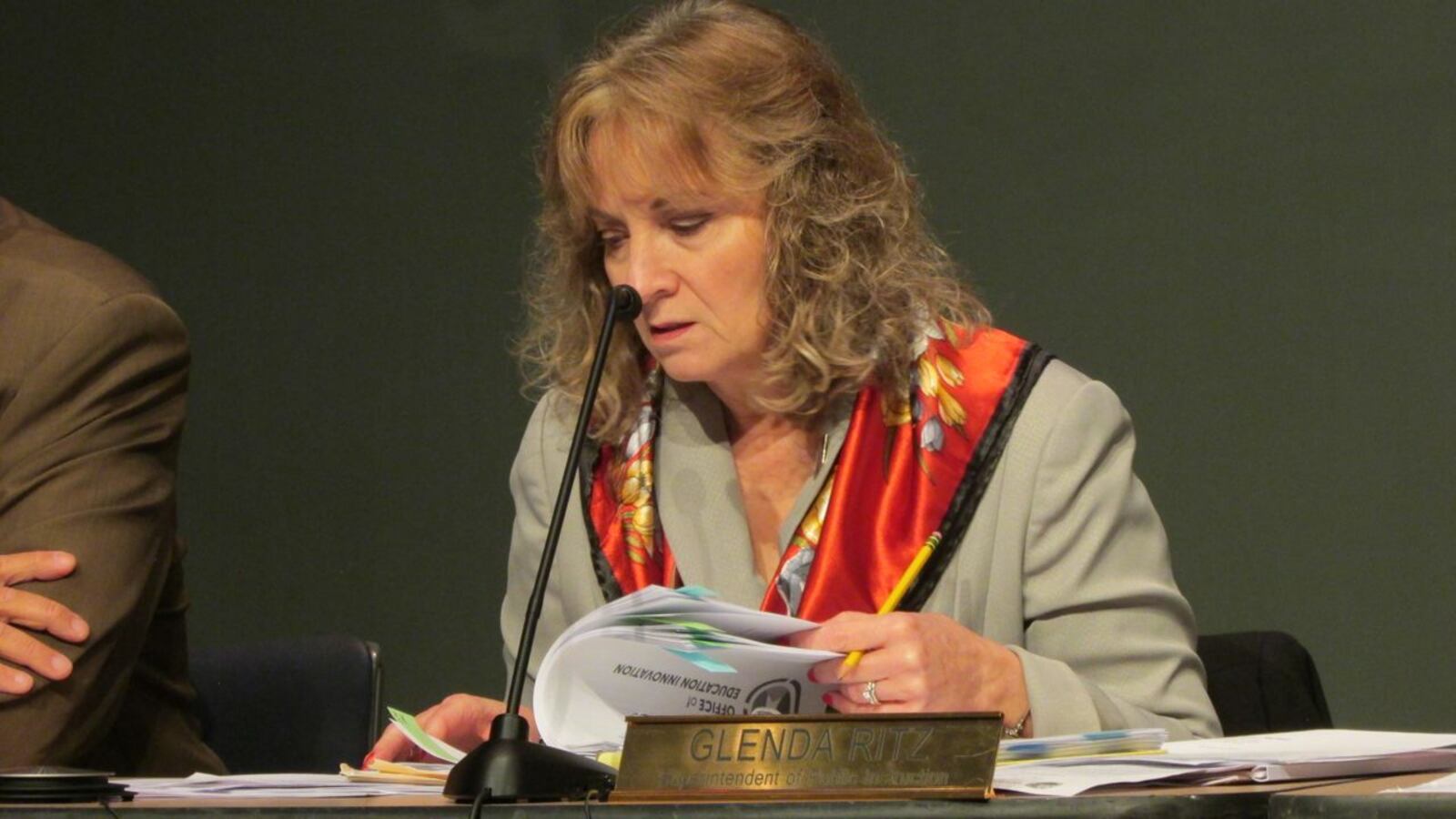Gov. Mike Pence’s unexpected move today to dissolve a key education agency and ask the legislature to allow someone other than state Superintendent Glenda Ritz to lead the Indiana State Board of Education surprised education leaders and activists, who responded with praise, doubt and questions about what it means for the future.
The long-quarreling state board is deeply divided between 10 appointees named by Pence and his fellow Republican predecessor, Mitch Daniels, and Ritz, the lone Democrat holding statewide office in the capitol. Pence has mostly endorsed Daniels’ standards, accountability and school choice initiatives while Ritz was elected promising to push for a reconsideration of those ideas.
Pence pitched his plan as a peace offering. By executive order he eliminated the Center for Education and Career Innovation, which Ritz railed against as a shadow organization designed to usurp her power, and said if the legislature permitted the 11 state board members to elect whoever they wanted as their leader it would promote “harmony and trust.”
It would also all but certainly lead to Ritz’s removal as chairwoman. At times, she has used the agenda-setting and meeting management duties of that post to try to combat proposals she opposed, ruling motions out of order over the objections of the rest of the board, for example.
Ritz’s supporters weren’t buying the notion that there was any goodwill in Pence’s plan.
“If the governor was truly concerned with ‘trust and harmony,’ he would trust Glenda Ritz to represent the people of Indiana and encourage his board to compromise and collaborate with our superintendent so that harmony would indeed exist,” said Cathy Fuentes-Rohwer, chair of the Monroe County and South Central Indiana chapter of the Indiana Coalition for Public Education, a group that has opposed many of Pence’s education policies.
Others were willing to accept Pence at his word that he wants to improve the situation.
“What that sounds to me is the governor’s looking for middle ground and compromise: I’ll not have the Center for Education and Career Innovation, but I want to know I have a board I can work with,” said Speedway Schools Superintendent Ken Hull. “I’d want to know what that looks like. That might work out well, but it’s certainly for the state superintendent to decide.”
Another key question is whether anything will change.
CECI’s website lists 13 people employed directly by the center. Others who work under the group in coordination with other state agencies are listed under those agencies, including four who work for the state board of education.
In a statement this afternoon, Pence announced that CECI’s co-directors both have new jobs. Jackie Dowd, who headed CECI’s career education and workforce development efforts will be chief operating 0fficer at the Indiana Department of Workforce Development. Claire Fiddian-Green, Pence’s top education adviser who has worked most closely with Ritz as CECI’s lead offical on K-12 policy, will leave government service to join the Richard M. Fairbanks Foundation as president and chief executive officer.
Pence’s statement said the state board will be responsible for hiring its own staff, so it could conceivably retain some of the CECI workers who would appear to be out of a job. That also means Ritz might still have to work closely with the staff of the state board. The board staff has had a fractured relationship with Ritz and her lieutenants at the Indiana Department of Education. Pence said he expects CECI to formally close up shop early next year.
If the state board ultimately wins the authority to name a new leader to replace Ritz, it could also give the board majority more sway over how the department is run and even who it employs.
Education reform groups that support Pence’s favored policies hailed his plan as a way to revive Indiana’s efforts to use school choice and accountability to improve schools.
“It is refreshing to see the governor recognize the dysfunction in education governance over the last two years,” said Betsy Wiley, president and CEO of Hoosiers for Quality Education. “We look forward to legislative action that will allow the State Board of Education to operate efficiently and effectively by selecting a chair who can build consensus and lead with kids’ best interests in mind.”
Justin Ohlemiller, executive director of Stand for Children Indiana, which advocates for change in school districts and at the state level, said was hopeful the fighting would die down if the state makes the changes.
“If that move can be a step in the direction to addressing the high level dysfunction, it’s a positive thing,” Ohlemiller said. “We are at a point where all of our state leaders need to really think about what needs to be done to eliminate the dysfunction and get back to healthily disagreeing about certain topics, but finding areas of agreement to tackle. There are substantial issues we have in our public education system in the state.”
Ritz said little after Pence’s announcement, hailing the elimination of CECI and promising to work with the legislature and the governor in the lawmaking process.
J.T. Coopman, director of the Indiana Association of Public School Superintendents, said the constant drama has caused real problems and frustration for superintendents across the state who are in the day-to-day work of improving their school districts.
“I hate for superintendents, principals, teachers and more importantly children to be caught in what I see as political infighting,” Coopman said. “We haven’t had clear direction for education in the state for over a year and a half now. By dissolving CECI, is that going to establish a clear vision and direction for education? Only time will tell.”

